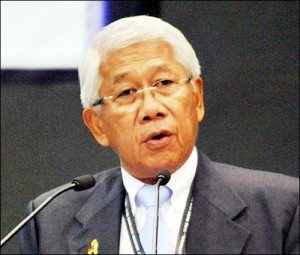PH may allow US bases here if …
Defense Secretary Voltaire Gazmin on Friday raised the possibility of the United States again being allowed to locate military bases in the Philippines if war should break out in the Korean Peninsula.
Gazmin conceded that the Constitution bans the establishment of US bases here.
“But in cases of extreme emergency, then there are extreme measures to be undertaken. Maybe this is one of them,” he said.
US military presence is an emotionally charged issue in the Philippines which in 1992 officially ended 93 years of US basing rights in the country when the US flag was lowered and the US Pacific Fleet sailed away from Subic Naval Base.
A year before, the Senate had voted not to renew the US leases to Clark Air Force Base and Subic Naval Base, then the two largest US military facilities outside the United States.
Article continues after this advertisementDenying US access to military bases was subsequently written into the 1987 Constitution that was drafted after the first Edsa People Power Revolution of 1986.
Article continues after this advertisementIf war breaks out…
Gazmin and other defense department officials believe that could quickly change if North Korea makes good its threat to launch a nuclear attack on South Korea, the US and its allies in the Pacific.
However, Gazmin clarified that the Philippines and the US have not yet discussed the possibility of setting up US military bases in case war breaks out in the Korean Peninsula.
Defense spokesperson Peter Paul Galvez explained that in the same way that a war in the Korean Peninsula is being discussed in the context of a world war, so is the possibility of basing US forces in the Philippines.
“If war breaks out, will we recommend to Congress to allow the US to have staging areas here? That’s still a question we have to thresh out,” Galvez said.
‘Rotational’ presence
Gazmin pointed out that even in the absence of US military bases, Philippine and US military cooperation can be seen in “exercises and increased rotational presence of American troops here in the area involved in exercises and training.”
The 62-year-old Mutual Defense Treaty (MDT) between the Philippines and the US allows an extended stay of US troops in the Philippines.
“But there is a gray area between an actual basing and an extended stay,” Galvez said.
He said that in the event of a war, an advanced command post, for example, would need coordination with land, air and naval assets.
“That is all in the MDT,” he said.
Galvez also stressed that Gazmin was not superseding the Constitution when the defense secretary broached the possibility of basing US troops in the Philippines should tensions in the Korean Peninsula escalate to a full-blown war.
“A good question to ask the Supreme Court is, will the Constitution hold if a world war breaks out?” he said.
